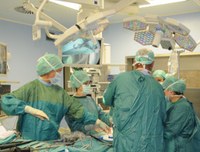
A pilot production of filtering nano-structured materials is about to start; hundreds of liters of sanitizing hydro-alcoholic solution for the Policlinico Sant'Orsola were produced.
The University of Bologna will test the masks for Emilia-Romagna healthcare staff. This will speed up, improve and favour the distribution of protection devices, since so many companies in the region offered to produce them. Researchers of the Alma Mater immediately got to work to set up two new labs to start the safety tests on masks from tomorrow. But there is more. Another research group is about to start the production of innovative nano-structured materials to be used in the manufacture of high-efficiency masks. Finally, at the Department of Chemistry, hundreds of liters of sanitizing hydro-alcoholic solution for the Policlinico Sant'Orsola were produced.
"This emergency doesn't stop our great community of researchers and professors, who are instead stepping up their efforts to be of help," says Rector Francesco Ubertini. "The current lack of masks for healthcare staff is a problem that needs prompt answers: our researchers responded to this challenge by sharing different skills and interacting with the industry and eventually they came up with innovative and tangible solutions in a very short time".
Stefano Bonaccini, president of the Emilia-Romagna region, comments that "a high-quality university and research system like ours is a source of pride, as we can rely on it to face this emergency with the promptest of responses". "Safeguarding the health of doctors, nurses and all the healthcare staff and medical professions as well as that of all the workers and the people in general is fundamental for us. What is now essential and strategic for Emilia-Romagna is being able to find out new materials and other innovative solutions to allow Italian industries to produce masks locally".
Protective masks need to meet some quality standards guaranteeing their bacterial filtration efficiency and their breathability in order to be safely used by healthcare professionals. In just three days, a multidisciplinary group of researchers led by professors Saverio Violante and Cristiana Boi set up new labs able to carry out complex safety tests for mask use in order to speed up the quality assurance process.
To do so, the UniBo researchers - chemical engeneers, occupational health professionals and microbiologists - repurposed the equipment once used to perform other functions and, by implementing them with new elements partially obtained by 3D printers, they created two labs for masks quality assurance: one for breathability testing, the other for bacterial filtration (bioburden) testing.
These labs are in Bologna at the Department of Civil Engineering, Environmental and Materials Chemistry (DICAM) in Via Terracini and at the Policlinico Sant'Orsola in the Pelagio Palagi area. Barring unforeseen circumstances, the labs will start working tomorrow, March 19. They will be available for all the mask-producing companies, so that a quick distribution to healthcare staff members is guaranteed. Besides Francesco Violante and Cristiana Boi the follwing UniBo colleagues also participated: Maria Grazia De Angelis, Matteo Minelli, Alessandro Paglianti, Riccardo Onesti, Andrea Berlingeri, Anna Barbieri, Francesca Graziosi, Laura Sabatini, Martina Cappelletti e Daniele Ghezzi. They all received the support of the Unibo community and, in particular, of the "Gruppo Applicazioni Industriali" (Industrial Applications Group) of the Industrial Engineering Department (DIN) and of the Industrial Chemistry Department. This initiative was also joined by IMA - Industrie Macchine Automatiche, who donated part of the technical instruments needed for the testing process.
At the same time, a further interdisciplinary research group of professors and young researchers at the Departments of Industrial Engineering (DIN), Chemisty "Giacomo Ciamician" and Information and Electrical Energy Engineering "Guglielmo Marconi" are working at a new type of highly-efficient masks.
With this goal in mind, these researchers are working in collaboration with GVS, a company in Zola Predosa (Bologna), at the pilot production of nano-structured materials. A synergy of a variety of transversal skills, ranging from polymer chemistry, to mechanical, electrical and chemical engineering.
This research group works in a lab that has been recently enlarged and upgraded to the pilot production of nano-structured materials. GVS is a world-class leader in the production of filters and filtering materials and contributes to this project by sharing its know-how about personal protective equipment, its productive capacity as well as its network of raw materials suppliers. Professors Andrea Zucchelli, Maria Letizai Focarete and Davide Fabiani alongside researchers Tommaso Maria Brugo, Giorgia Pagnotta and Filippo Groll are the members of this research group.
Protective masks are surely essential for the safety of healthcare staff members and patients alike, but so is sanitizer availability. For this reason, a group at the Department of Chemistry "Giacomo Ciamician" produced 250 liters of hydroalcoholic solution for the Policlinico Sant'Orsola.
This disinfecting liquid was produced by following the OMS guidelines, eventually obtaining the ingredients thanks to the help of the Department of Biology, Geology and Environment (BIGEA) and a network of partnering companies, due to the current scarce availability of the necessary elements. The group who produced the sanitizer is composed of: Sonia Casolari, Lucia Ferrazzano, Fiammetta Ferroni, Silvia Parmeggiani, Andrea Garelli, Stefano Grilli, Alberto Filetti, Matteo Iurlo, Luca Prodi.
